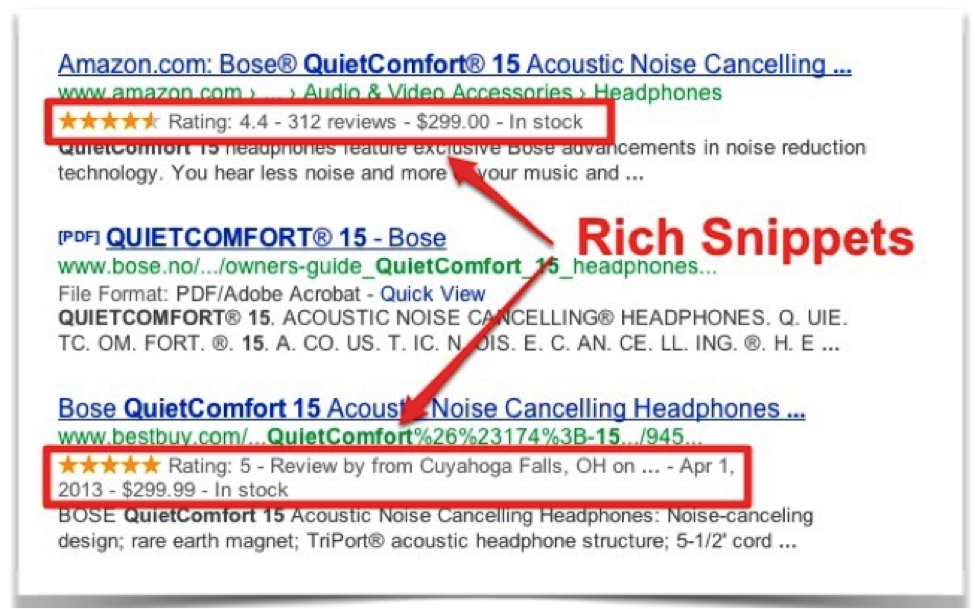Rich Snippets have gone in and out of popularity and importance over the past few years, so it’s tough to say if this time they are back for good. However, in 2016 specifically Google still encourages them and they are definitely still being used, so it’s important to analyze how things changed and how you can get the most out of rich snippets this year. It’s better to be prepared, know what rich snippets are, and how they could positively affect you in the long run than let them fall by the wayside, so consider some of the rich snippet considerations below.
What is a Rich Snippet?
A rich snippet is HTML code that is placed on web pages that provides Google and other search engine bots with explicit pieces of information to crawl, which are also about the content of any given page. More recently, Google has made rich snippet content very specific as you can see in the screenshot below:
Rich snippet codes are not always visible on a page viewed in a browser. They sit in the HTML code ‘behind’ the page content. Rich snippets are micro-data you can add to your HTML that enable you to apply more detailed information to your search engine listings. Ultimately, when you follow Google’s guidelines the contents of your rich snippets appear in the search results along with the title and description of the page.
What exactly is eligible for Rich Snippets?
In order to make your pages eligible for Rich Snippets in search results, you will need to add structured data to your content (Google claims that they support Rich Snippets for the following data types here, so that you can see if you fit the bill).
Product Information: Information about a product, such as price, availability, and review ratings.
Review: A review of an item (we already covered this in products), but also places or events such as a restaurant, movie, or store.
Recipe: Recipes that can be displayed in web searches and Recipe View.
Video: An online video, including a description and thumbnail.
News article: A news article, especially including a headline, images, and publisher info.
Event: An organized event, such as musical concerts or art festivals, that people may attend at a particular time and place.
Software Application: Information about a software app, including its URL, review ratings, and price.
Note: Once you’ve marked up your site’s content with HTML rich snippet micro-data, you can test it using the Structured Data Testing Tool. Google will discover it the next time they crawl your site, although they do claim that it may take some time for rich snippets to appear in search results.
Also remember that you can us your blog content and other existing content on your website as well. You want to make sure you have the most relevant content with images that can be used, which you can learn more about here.
Generating Rich Snippets
If you need help generating your rich snippets Schema.org Generator for SEO Rich Snippets & Microdata Generator, is a highly praised site for generating the HTML text that many do not know how to do on their own. It is also said to be very valuable for search engines who are deciphering the code and reporting the data for search results and rankings. According to Web Marketing Today, local businesses that use schema have a competitive advantage over those that don’t—this may just a consequence of not having someone who can write HTML with ease, in-house.
The Verdict: In 2016, Rich Snippets are Still Relevant to SEO
While Google can not guarantee that your mark-up and rich snippet data will be used in search results, especially if they are not formatted correctly or do not meet the right criteria, it can still improve your online performance and get your page crawled more for SEO ranking criteria. Ultimately, I find it helpful to think of using rich snippets in terms of how it positively impacts search engine visibility, improved click-through rates, and user experience. This is still seen as a critical best practice for improving your online performance.
If you take all of that into account, I think it is safe to say that they do still matter in 2016, especially if you break down how they are used by content-type, and how they can still positively effect you even if they don’t end up showing in the search results.
Have you had any interested success or experience with Rich Snippets? Do you have any predictions on what their importance will be this year or how they might change over time? Let us know in the comments section below—we would love to hear from you!




